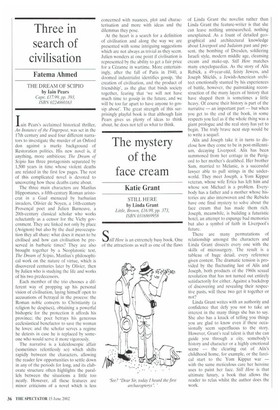Three in search of civilisation
Fatema Ahmed
THE DREAM OF SCIPIO by fain Pears Cape,I17.99, pp. 393, ISBN 0224060163 lain Pears's acclaimed historical thriller, An Instance of the Fingetpost, was set in the 17th century and used four different narrators to investigate the murder of an Oxford don against a murky background of Restoration politics. His new novel is, if anything, more ambitious; The Dream of Scipio has three protagonists separated by 1,500 years in time whose violent deaths are related in the first few pages. The rest of this complicated novel is devoted to uncovering how these deaths came about.
The three main characters are Manlius Hippomanes, a fifth-century Roman aristocrat in a Gaul menaced by barbarian invaders, Olivier de Noyen, a 14th-century Provencal poet and Julien Barneuve, a 20th-century classical scholar who works reluctantly as a censor for the Vichy government. They are linked not only by place (Avignon) but also by the dual preoccupation they all share: what does it mean to be civilised and how can civilisation be preserved in barbaric times? They are also brought together by a Neoplatonic text, The Dream of Scipio, Manlius's philosophical work on the nature of virtue, which is discovered centuries later by Olivier, then by Julien who is studying the life and works of his two predecessors.
Each member of the trio chooses a different way of propping up his personal vision of civilisation, laying himself open to accusations of betrayal in the process: the Roman noble converts to Christianity (a religion he despises), obtaining a powerful bishopric for the protection it affords his province; the poet betrays his generous ecclesiastical benefactor to save the woman he loves; and the scholar serves a regime he detests in case he is replaced by someone who would serve it more vigorously.
The narrative is a kaleidoscopic affair (sometimes relentlessly so) which shifts rapidly between the characters, allowing the reader few opportunities to settle down in any of the periods for long, and its elaborate structure often highlights the parallels between the situations a little too neatly. However, all these features are minor criticisms of a novel which is less
concerned with nuances, plot and characterisation and more with ideas and the dilemmas they pose.
At the heart is a search for a definition of civilisation and along the way we are presented with some intriguing suggestions which are not always as trivial as they seem. Julien wonders at one point if civilisation is represented by the ability to get a fair price for a Cezanne in wartime. More entertainingly, after the fall of Paris in 1940, a doomed industrialist identifies gossip. 'the creation of civilisation, and the product of friendship', as the glue that binds society together, fearing that 'we will not have much time to gossip in the future, and we will be too far apart to have anyone to gossip about'. The great strength of this surprisingly playful book is that although lain Pears gives us plenty of ideas to think about, he does not tell us what to think.


































































 Previous page
Previous page